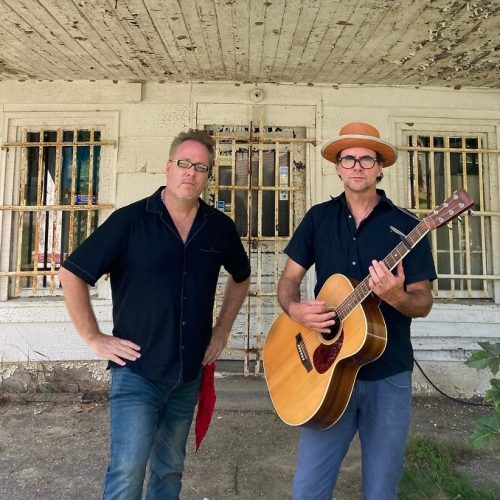The Western genre runs deep in American musical culture. Countless artists in various g genres have been influenced by classic Western iconography. Vaca Sagrada draws on these traditions to create the evocative images of “border song”. The partnership of David Brooks and Jeff Wiederschall come together to write songs for a Western tragedy. Inspired by the writings of Cormac McCarthy (Blood Meridian, No Country for Old Men, etc.), “Border Song” serves to paint an image of the lonely Western wanderer.
The song begins with a lonely acoustic guitar, with the rest of the sparse instrumentation rolling in with Brooks’ vocals. Each line introduces another sound to shore up their soundscape until a percussive roll from Wiederschall brings us to the first smooth verse. There’s something lonely about “Border Song”, not just in the lyrics but in how the instrumentation of the song will find its own spaces to shine. Each guitar will step up to where the last draws out, there’s less layering than one would expect and every sound feels plucked from the memories of a wandering desperado. Wiederschall’s percussion breaks up the smooth flow from each verse, helping to add a texture under the sunny and dry leads. Everything comes together to feel extremely authentic and evocative of the existential Westerns that the duo seek to emulate.
Lyrically, “Border Song” is a strange beast. Brook is clear without being radiant. The sound feels like it is ‘riding’ on the guitar. Alongside this are lyrics telling the story of someone wandering the sandy wastes. The first two verses make great use of evocative imagery- describing the weather and the dire circumstances of our speaker. “Raindrops sizzle on embers / And there’s nothing in the pack to eat–so I ride.” From here, the sense of motion is reinforced with the percussive accents from Wiederschall. Again they rise, and they find a camp. Another day, and against another painted sky, the speaker rides on. All the instruments cut out, and only the lyrics of Brooks usher in a final verse. The speaker wanders on, not knowing anything else. “I don’t anymore know why I ride / I don’t anymore know why I rise”.
Brooks and Wiederschall know their genre, and lean heavily on the musical and thematic trappings of that gothic western to sell their sound. There is something deeply personal and grim to “Border Song”, and this feeling brings the listener along on the journeys of Vaca Sagrada, the sacred cow’s head.
I interviewed David Brooks about “border song,” and this is what he had to say.
Vaca Sagrada is a very evocative name for a group; where did it come from?
About twenty years ago I was hiking in a pasture in Uruguay and spotted a horned bovine skull and carcass. I brought the skull home to Connecticut in my suitcase and it hung above my fireplace, Georgia O’Keeffe-style, for many years. After photographing and retouching it I suddenly saw a surrealistic internal landscape- almost a Dali-like plain of consciousness and the name Vaca Sagrada emerged from that. The image has a restless nature and leads the viewer in opposite directions simultaneously, an approach I often take to song lyrics.
You’ve listed Cormac McCarthy as an inspiration for “Border Song”, what would you say inspired you from his works?
That primal desolate landscape and the road-ethic of the traveler; the kindness of strangers feeding fellow travelers coupled with the dangers of the road; the pathos of the rider following through with a plan whose purpose he’s long forgotten; out of time in a beautiful but existential restlessness; watching an approaching storm over a vast landscape. That state of being between two worlds is what I connected to in reading McCarthy.
Where would you set your songs? Are they tied to a place in the world?
Most of my songs involve a setting and I picture places when writing lyrics and singing. On this record it’s a bonfire in coastal Cape Cod at night, it’s the plain of primitive mankind building the Tower of Babel, it’s Noah and his burden of animal waste management on his ark and in the case of “Border Song,” it’s the raw country separating Mexico and the states. I guess I rely on places more than I realized in constructing songs.
How much do you bring from your own personal projects into Vaca Sagrada?
The album is the manifestation of my thoughts, readings and obsessions of late. I tend to write topical songs as opposed to self-referential iconography. Jeff has known me for so long and knows how our playing serves a certain story telling approach. We look at the music as intended to illustrate the story although it’s sometimes the words serving to embellish the mood of a song.
The music you two create has been called “cinematic” in the past. Could you see your music on the silver screen?
When we were tracking “Border Song,” our engineer described the mood of the song as: “driving down a desert highway on a sunny Sunday afternoon with a body in the trunk.” I love that he arrived at that slightly disturbing but exuberant vision from hearing the mood of the music. Although that story of that song doesn’t involve a dusty Corvette driven by some derelict, charming killer, if that’s what it brought up for Tracy then I consider the song a success.







